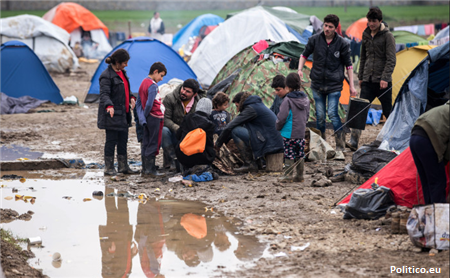 By Francesco Femia and Caitlin Werrell — The Mark News —
By Francesco Femia and Caitlin Werrell — The Mark News —
The greatest migration since World War II continues. Refugees are flowing in record numbers from around the world. It is a humanitarian crisis of the highest order. The cause of this migration is often war and conflict. However, that explanation only begins to scratch the surface.
The 21st century is a time of increasing social, political and economic complexity, a time when the pace of change is straining the capacity of governments to keep up. One such complexity involves unprecedented stress on natural resources as a result of climate change, demographic pressures, and the inability (or unwillingness) of governments to manage those changes. Within this context, the likelihood of governance breakdowns, including state instability and mass migration, is already increasing. Given future climate and population projections, those breakdowns could, in the absence of comprehensive, preventive actions, get a lot worse.
The effects of climate change on state stability and migration will vary across the globe because of differences in regional weather patterns, geographies and governance. That said, many regions of the world, both poor and rich, are likely to witness climate-exacerbated migration.
Let’s take Syria as a case in point. The Middle East country is not the first “climate war,” and climate change is not causing the Syrian refugee crisis. A major conflict is responsible for that. If we take such simplistic claims seriously, we run the risk of absolving governments, such as the Assad regime, of their responsibility to protect and provide for their populations. On the other hand, underestimating the risks associated with climate change could also mean missing important contributing factors to state stability and migration. In this case, evidence suggests that climate change has been a factor in creating the conditions underpinning Syria’s fragility – and that this fragility is partly responsible for the situation the country finds itself in today.
Consider this: In 2011, a study from the National Oceanic and Atmospheric Administration (NOAA) found that climate change contributed to declining winter precipitation in the broader Middle East from 1971 to 2010, and Syria had been one of the hardest hit. Another study demonstrated that an extreme drought in the country from 2007 to 2010 (the worst in its history of records) was two or three times more likely because of climate change. Building off research conducted by the United Nations, these dynamics, when coupled with the significant natural resource mismanagement by the Assad regime, contributed to a mass internal displacement of around two million farmers and herders during the period of the drought. This internal displacement may have been a significant factor in driving political unrest, which has ultimately led to the refugee crisis we see today.
So a lot of data exists. It’s just being ignored by the people who need to know it most.
While overstating climate risks over others can be very problematic, ignoring those risks can be even more dangerous. Growing evidence suggests that the tools governments use to analyze the fragility of states are outdated, and do not adequately address climate and natural resource-related risks. While there are surely a number of reasons for the misdiagnosis of Syria, evidence suggests that key natural resources are often missing from analyses of a country’s fragility.
The future is not wholly predictable, but evidence that climate change is connected to state fragility and migration is growing. And while scholars must continue to seek greater certainty in those connections, policy makers do not have the luxury to wait for that certainty – particularly in today’s rapidly-changing environment, where such delays may be implicated in state failure and humanitarian crisis.
Governments must be more concerned with false negatives than false positives. If a government assesses a situation, fails to detect a problem, and that problem arises, it will be held responsible for not adequately protecting the public. In the case of climate change as a possible contributing factor to state fragility and migration, there exists a sufficient degree of certainty for governments to responsibly act to mitigate the risks. We should not demand that governments wait for near-perfect certainty before acting.
We know that populations are growing and urbanizing, seas are rising, and extreme weather events are getting more frequent and intense. We know that these dynamics will place additional stresses on the food and water resources that underpin the security of populations around the world, and that this will likely increase the scale of migration. Despite these dynamics, policies designed to humanely and comprehensively address such issues are severely lacking.
Governments need to take a more preventive approach to human, national and international security. Waiting for humanitarian crises to hit the front pages before acting has proven a great failure of the international community in the past few decades. How we respond to that failure will be the measure of our resilience.
 Francesco Femia and Caitlin Werrell are Co-Founders & President of the Center for Climate and Security, and Co-Chairs of the Climate and Security Advisory Group (CSAG).
Francesco Femia and Caitlin Werrell are Co-Founders & President of the Center for Climate and Security, and Co-Chairs of the Climate and Security Advisory Group (CSAG).





